
In a recent analysis, experts suggest that former President Donald Trump's efforts to curtail the electric vehicle (EV) transition may only serve to moderate, rather than halt, the momentum towards a cleaner automotive future. As the automotive industry increasingly embraces electric technology, it appears that this transformation is firmly rooted in consumer demand and industry innovation, which are likely to continue evolving regardless of political influences.
Trump has made headlines by criticizing the Biden administration's push for electric vehicles, emphasizing his support for traditional gasoline-powered cars during his public engagements. His administration's legislative platform included initiatives aimed at rolling back significant environmental regulations that could impact EV-related policies. However, speaking to a crowd that largely supports green energy initiatives at a recent rally, Trump’s comments found mixed reactions.
Despite Trump’s advocacy for fossil fuels, the reality of the automotive market is shifting. Leading automakers like Ford, General Motors, and Tesla are investing tens of billions of dollars in EV technology and infrastructure. This shift is not merely a response to policy but a proactive strategy molded by corporate strategies and market pressures. Many companies aim for significant EV sales targets by the end of the decade, a clear signal that they see value in electrification regardless of political machinations.
Experts also highlight consumer interest in electric vehicles as a crucial driver of this transformation. Increasing environmental awareness, rising fuel costs, and improving EV technologies make electric vehicles more appealing to the average consumer. According to various surveys, a growing number of consumers are already considering EVs for their next vehicle purchase, showcasing a generational shift in attitudes towards sustainability.
This consumer shift is reinforced by legislative measures at the state and local levels, where leaders are promoting initiatives to support the adoption of electric vehicles. California, for example, has laid out ambitious plans to phase out gasoline-powered cars entirely by 2035, leading a host of other states to develop similar policies. These initiatives suggest that while federal policies under different administrations may vary, the EV wave is more than just a political issue; it has a life of its own.
Furthermore, as advancements in EV technology continue to lower costs and improve performance, the transition to electric fleets becomes increasingly viable for households and businesses alike. Notably, the Biden administration's invocation of substantial investments in green technologies serves to bolster this industry shift. As more charging stations are established and battery technology improves, the barriers to EV adoption diminish.
In conclusion, while Trump’s political ambitions may dictate attempts to slow down the EV revolution, the realities of market dynamics, consumer choices, and technological advancements suggest that he can only tap the brakes. The electric vehicle revolution is set on a course that is difficult to redirect, supported by a confluence of industry readiness and evolving public sentiment towards eco-friendly transportation solutions.
#Trump #ElectricVehicles #EVRevolution #Sustainability #BidenAdministration #GreenEnergy #AutomotiveIndustry #ConsumerChoice #ClimateChange
Author: Sophie Bennett




